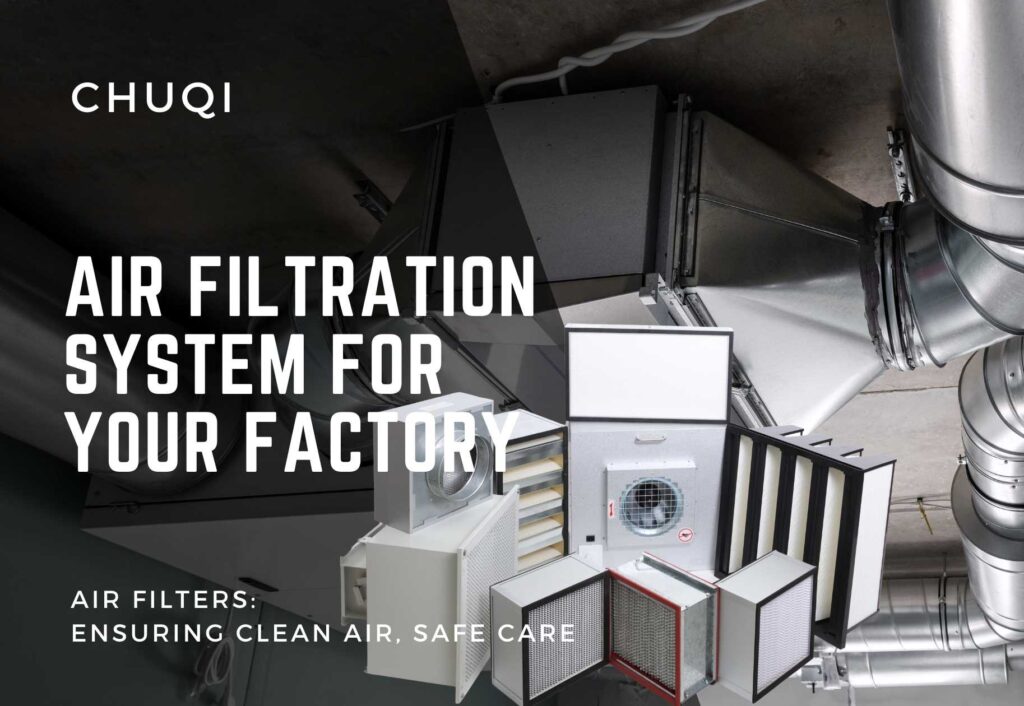When selecting the right industrial air filtration system for your factory, several key factors must be considered to ensure the system meets your specific needs and maintains a safe and clean environment. Here are some key considerations and steps to take:
I. Determine the Type and Degree of Pollution in the Factory
Analyze the Production Process
Carefully study the factory’s production process to determine the types of pollutants that may be produced. For example, chemical plants may produce harmful gases, chemical vapors, etc.; manufacturing industries may produce dust, metal particles, etc.; and electronics plants may produce electrostatic dust, etc.
Understand the special requirements of the production process, such as the need for explosion-proof, anti-static, etc.
Evaluate the Level of Pollution
Conduct an air quality test to understand the pollution level of the existing air in the factory. Professional air quality monitoring equipment can be used to detect the concentration of airborne particles, harmful gases, etc.
Refer to relevant industry standards and regulations to determine the air quality standards that the factory needs to meet.
II. Consider the Performance Parameters of the Filtration System
Filtration Efficiency
Select the appropriate filtration efficiency based on the type and degree of pollution in your factory. For example, for environments that require very high air purity, such as pharmaceutical and electronics manufacturing, choose HEPA or ULPA filters, which are capable of capturing very small particles.
Understand the filtration ratings and standards of your filters to ensure that they are effective in filtering out the major contaminants in your plant.
Air Flow
Calculate the air flow required for your plant to ensure that the filtration system will meet your plant’s ventilation needs. Air flow calculations need to take into account factors such as the size of the plant, its height, the number of people, and the operation of the equipment.
Select a filtration system with the right air flow rate to avoid poor filtration due to insufficient air flow or wasted energy due to excessive air flow.
Resistance and Energy Consumption
The resistance of the filtration system affects the energy consumption of the ventilation system. Choosing a filtration system with lower resistance can reduce the operating costs of the ventilation system.
Understand the energy consumption of the filtration system, including the power of the fan, running time, etc., in order to conduct a cost-benefit analysis.
III. Consider the Applicability and Reliability of the Filtration System
Application Scenarios
Different filtration systems are suitable for different application scenarios. For example, bag filters are widely used in most industrial places and are suitable for handling large quantities of air and larger particles, while HEPA filters and ULPA filters are more suitable for environments with extremely high requirements for air purity.
Consider the plant’s space layout, installation conditions, and other factors to select the right filtration system. For example, some filtration systems may require larger installation spaces or special mounting methods.
Reliability and Durability
Select a filtration system with good reliability and durability to ensure that it can operate stably for a long time. You can check the filtration system’s brand, reputation, and quality certifications for information on its reliability and durability.
Consider the maintenance and replacement cost of the filtration system and choose one that is easy to maintain and replace. For example, some filtration systems may require regular replacement of filter cartridges, and the cost and difficulty of replacing the cartridges need to be taken into account.
IV. Consider Cost-Effectiveness
Initial Investment Cost
Compare the prices of different filtration systems, including the price of the equipment itself, installation costs, etc. It is also important to consider the service life and performance of the filtration system to ensure that it will be cost-effective in the long term.
Running Costs
Consider the running cost of the filtration system, including energy consumption, maintenance costs, and the cost of replacing filter cartridges. Choosing a filtration system with lower running costs can reduce the operating costs of the plant.
Environmental Benefits
Some filtration systems may have better environmental benefits, such as the ability to reduce energy consumption, reduce pollutant emissions, etc. Considering the environmental benefits of filtration systems can contribute to the sustainable development of the plant.
Conclusion
In conclusion, selecting the right industrial air filtration system requires a comprehensive consideration of your factory’s specific needs, the system’s performance parameters, applicability, reliability, and cost-effectiveness. Through scientific analysis and comparison, you can choose the most suitable filtration system for your factory to guarantee the safety and cleanliness of the factory environment.

